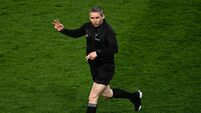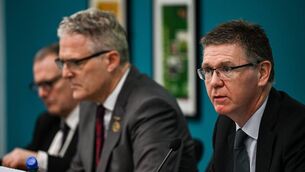The Declan Bogue Interview: John Finucane is a safe pair of hands

Tomorrow, John Finucane will organise his goalkeeper’s glove bag and attend to his last-minute preparations before leading Lamh Dhearg out in the Antrim final against Erin’s Own, Cargin. He’ll be 39.
The same age as his father Pat was when loyalist assassins sledgehammered their way into the family home. Another Sunday. February 12, 1989.
Pat Finucane rose and ran towards the glass door but was flung back by a bullet. Another caught his wife Geraldine in the ankle. 14 shots were fired in total, 12 of them into Pat’s head.
‘’I can only hear the bangs. Fourteen shots. Coming and coming, like they would never stop,’’ said Geraldine Finucane, in an interview with The Boston Globe.
The noise, the smoke, the absolute dread, panic, and fear.
Then, screaming.
The children — Michael, Katherine, and John the youngest at 8 — sat rigid as the gunmen ran out. The getaway car doors slammed and they escaped without having to worry about the usual roadblocks and checkpoints. That had already been taken care of.
Thirty years on, they know. They know all about the collusion, the double agents in the pay of the RUC, confidential files that were destroyed in a fire.
Finucane became a target because of information fed from MI5. As a solicitor, he had defended republicans. He had brothers in the IRA, but he also defended a number of loyalists in Madden Finucane, the legal firm he established.
RUC interrogators in the notorious Castlereagh barracks told Pat’s clients that they would get to him. ‘We’ll just drop Pat’s name to the UDA.’
Thirty years of investigation after report. Report after probe. None of them provided any satisfaction to the family until this February when the British Supreme Court found that all previous investigations didn’t adhere to the International Human Rights standards and put it back to the British government.
“Now, they tried everything,” says John.
“They tried reviews by barristers and judges and policemen but none of that has been credible. So we say the only thing that is left to do is to have an inquiry — an inquiry they have previously committed to having.
“They have stalled since February and last week we were forced to go back to court to force them to come to a decision and tell us what they are going to do.”
He continues: “Thirty years is obviously a huge number. When I was a teenager, I would have watched the Bloody Sunday families marching in Derry with 20 years, 25 years, 30 years banners and you wonder to yourself: ‘Right, you obviously support and you are sympathetic, but how can you go for that amount of time?’ And then, 30 years on, you understand exactly how you can keep going.
“You meet other families who are campaigning for their loved ones who were killed long before my father was killed.
“And it makes perfect sense because people have a natural desire and hunger for the truth.
“In a wider sense, I think it is very important we know exactly what went on here no matter how ugly that truth is, because it ensures we never, ever go back to those times again.”
As the years rolled on and more revelations surfaced, the Finucanes lived in a surreal world. Geraldine kept normality going within the home while the children attended school but it wasn’t unusual to come home and find a delegation of US lawyers cramped on the sofa or drinking tea in the kitchen.
Family trips changed from holidays in France to meetings with the British government in London or to the United Nations in Geneva.
“There would be times when there wasn’t a lot happening with the case and it wouldn’t be in the news,” says John.
“But first and foremost I am very proud to be the son of Pat Finucane.
“I think especially going into law as well [has helped], I can only imagine the atmosphere in which he professionally worked and lived his life.
“Thankfully, lawyers don’t have to go through that now, but it is something I have always felt important, that has not just from a personal point of view but as the years have gone on, it’s quite clear that this represented more than the killing of one person. The British government wouldn’t be throwing the resources they have thrown at us for over 30 years if they were solely trying to protect what they did on one occasion.
“I mean, this was very much a policy. We have been apologised to, both publicly and privately by prime minister David Cameron because of the collusion that occurred and was accepted to have occurred.
“Where the positions differ is where we say there needs to be a public examination, a mechanism in which our family can take part. Because everything to this point has been behind closed doors and the family haven’t been engaged and asked questions to find out what happened.”
Collusion. It’s a word now synonymous with the Dirty War, but back in the ’90s, those that mentioned it, well…
“You were seen as a republican propagandist when you made that accusation, to have that atmosphere and raise three kids, I can’t imagine what my mum went through,” says John.
“I am incredibly proud of her strength in keeping the family together and raising us three.”
Geraldine and Pat were an interesting couple. He, the working-class kid from the Falls Road, the first to go to college in his family. Trinity, no less.
It was there he met Geraldine; a middle-class unionist from the Upper Newtownards Road. In Belfast, they could never meet.
Away from it, their love flourished and they were married, before coming home to a Belfast that had grown ever-more combustible.
“We would never distinguish between anybody that wants to get to the truth. Losing a loved one no matter the circumstances is traumatic,” Finucane says.
“But if it is in the context of the families not having the information, then it is a fundamental vehicle, an absolute moral right that they are entitled to that information. And the fact that we still continue to struggle with our past remains a blight on our society and continues to hold us back.”
John followed his father into law. For a time, he worked in the business he established, Madden-Finucane, before starting his own partnership, Finucane-Toner.
It’s a role he balances with being Lord Mayor of Belfast. Being in Sinn Féin, the role was once unattainable, but the success of previous office-holders Arder Carson and Máirtín ÓMuilleoir has done much to smooth relations and made Belfast City Council a more welcoming environment.
His life takes a lot of forward planning. It took Lamh Dhearg three games to get past Casements of Portglenone in the county semi-final. Before the replay, Finucane had just stepped off a plane from Boston.
Prior to the third instalment on Monday night, he attended an event relating to his father that was due to start at 5pm, but ran on.
He had just enough time to grab his kitbag and dash to Ballymena for their victory and a place in tomorrow’s final at Corrigan Park.
Tuesday began with an early start, into the gym for a bit of stretching and a period on the spin bike to loosen out before that evening sitting through a six-and-a-half-hour debate of Belfast City Council where he felt every ounce of his mayoral chains.
Wednesday brought an interview with a German and Austrian media company focussing on the impact of Brexit, and he escaped for training that evening.
In between times, he was dashing over to the offices of Finucane Toner to catch up on work. Business is brisk. In September they won a defamation case for Republic of Ireland soccer player James McClean who was called a “super provo” by UUP councillor Chris McGimpsey, who was ordered to pay out £63,000.
In the new year, they will represent boxer Carl Frampton in a legal dispute over purse money against Barry McGuigan’s Cyclone Promotions company.
An especially sweet victory came in the summer when police were forced to drop an investigation into journalists Barry McCaffrey and Trevor Birney who had their homes raided by Durham Police, arising out of collusion revelations in their superb documentary on the 1994 Loughinisland massacre,
No Stone Unturned.
Throughout his life, football has been a constant.
He was between the sticks when Antrim reached two Ulster minor finals in 1997 and ’98, only to be denied by Tyrone’s golden harvest that would go on to claim senior All-Irelands.
He went to Scotland for University, England for professional exams and on his return he flitted in and out of an Antrim team that were constantly chopping and changing managers with under-investment in resources and organisation leading to often chaotic scenes.
The manner of his Championship debut in a 2006 loss to Fermanagh gave him a taste for the Vaudeville acts that Antrim specialised in that era.
They hadn’t realised that their green goalkeeper’s jersey would clash with the home team, and so their goalkeeper Paddy Murray wore a Dublin replica top.
In the second half he was injured. The fleece on Finucane’s back was already sodden, so the crowd were treated to the sight of Murray peeling off a soaking Dublin jersey for Finucane to wear. In the Championship.
The final insult was yet to come.
“We went back into the changing rooms and I was looking for my trainers after getting showered and changed, and I couldn’t find them,” Finucane recalls with a smirk.
“A guy from the county board came down and handed me two absolutely soaking, wringing pair of trainers and said he didn’t want to get his own shoes wet, so he very helpfully took mine.
“And you had members of the county board at that time that were sitting in the dugout while players were standing outside, getting soaked.
“It was one of those moments, it was so surreal, you didn’t know if it was actually happening. Big Paul Doherty from Rasharkin, every time I bump into him, he is still laughing at this. As do most people! There are more people talk about it than were in the changing rooms.
“Paul was laughing at this, more in exasperation than anything else, and handed me his shoes that were much too big for me. So I walked back onto the bus in a pair of clown
The arrival of Liam ‘Baker’ Bradley at the tail end of 2008 changed everything, but only for a while. They reached the 2009 Ulster final. The week after, Finucane was in goal when they gave Kerry a real scare in a round-four qualifier in Tullamore.
By 2011 they were a Division Two side, but a year later Bradley was gone. Finucane was struggling with injuries under new manager Frank Dawson and decided to concentrate on his club career.
That decision freed up time for his political ambitions.
The Belfast of 2019 has undergone several transformations. Back when Pat and Geraldine were growing up, the city centre was shut off at nights. People worked and socialised among their own communities. In those circumstances, and stirred up by factions, suspicions of the other side were nurtured and encouraged.
In 1989, 30 civilians lost their lives in the conflict. Now, Belfast is a sharply on-trend city. It has coffee chic and hipsters.
The city needs a mayor like Finucane with his intellectual curiosity. He doesn’t take it for granted.
“It is a position that I had no connection with, in a building I had no connection with.
“Growing up, it was very much a closed shop and you wouldn’t be able to sit on the grass outside City Hall, let alone feel that you had any connection with what was going on inside. Whereas I think now that Belfast is a completely different city. Belfast is a different council and the role is very different to when I was growing up. I am very proud of that as well and it’s great to see so much of Belfast.
“Growing up, Tom Hartley told me that you only think you know your city. I live in north Belfast, I have always worked in the city centre, Da’s family is from the west, mum’s family is from the east, I always had a good grasp of the city. But you really don’t know what is going on until you see it as a mayor and the great work that doesn’t get the attention it deserves. I am very lucky.”
It takes a force of personality to go into areas where you know the welcome mat might not be
hung
laid out. A few years back, Máirtín Ó Muilleoir arrived at Woodvale Park on the Shankill to plant a tree, but instead was met by an angry mob that attacked him.
There are many in the city that struggle with the concept of a Sinn Féin lord mayor, but Finucane can only point to his record.
“At the start when I described myself as a ‘Mayor For All’, I was asked: ‘How could you say that, how could you expect people to believe that?’
he states.
“I would say back: ‘Judge me by the end of my term.’
“And I was grateful, to be honest, to be able to show that on day one when Prince Charles was coming into Belfast City Centre to look at the Primark site where the fire was last year. And there were a number of opportunities I have had over the last year that I have taken.
“I think it is important that while we still live in a society where there still is a degree of suspicion, that whenever there are opportunities, especially in a role which is there to represent everybody, I would be quite firm that the role of mayor shouldn’t be party political. Obviously I bring my own politics to it, but it is not in the gift of Sinn Féin for the year; it is there to represent and show off the best of Belfast, and I try to do it. It’s up to others to judge how successful I am at that.
“But I would certainly try to be as inclusive as possible. Not just in my term, but I said this when I was installed as mayor, not solely in the context of green or orange, past and present, but also in the fact that Belfast is now multi-cultural, multi-ethnic.
“We have people who identify as neither in the city. I think that everybody in this city needs to be represented, and represented well. Especially given the vision and ambition we have for Belfast over the next 15, 20 years.”
All of that vision and ambition could be derailed by more immediate matters and the incoming farce of the DUP backing up the border plans of the far-right fringe of the Tory party.
“Not to sound flippant, but I am always reluctant to talk about Brexit if I haven’t looked at the news in the previous hour as you could be way out of the loop because things are constantly changing,” says Finucane.
“And that’s where, certainly since the referendum in 2016, people have thought they seen chaos under Theresa May, but that has gone to a new level since Boris Johnson went in.
“The closer we get to October 31, there’s a little more panic and hysteria and, I think, danger in the comments and proposals that are coming out of London.
“They are playing games and they are sadly supported in that by the DUP. People who will suffer in all of this are the people in Ireland, and it doesn’t matter what side of what is now an invisible border, people get it.
“Thankfully, those in Brussels and other member states get it. People in America are getting it and the comments in Congress of protecting the Good Friday Agreement that people worked for, for many years and protected for so many years, I think we see that support on an international level, more than makes up for the fact we know the interests of the people here is not is what is at the heart of those in London and Westminster.”
Everyone lives their own reality. From balancing a busy solicitor role, threading the razor-thin line of diplomacy as a lord mayor, the pressure of a county final may feel like nothing, but that’s not the case.
“I am not different from any club keeper getting ready for the county final — make sure you are sharp and ready to play the tactics that are decided upon on the day.”
His four children will be there to see their father. Sixteen-year-old Piaras is on the Ulster Water Polo team. Caoimhe at 15 has inherited “my ability to be a bad loser and be very competitive,” and lines out at midfield for the Antrim ladies’ under 16 team.
They’ll be there with younger siblings Oisín (9) and Eoin (8), decked out in the white and red of Lamh Dhearg.
There to see their daddy in a county final.
30 years on. 39 years of age.
The same age as Pat.













